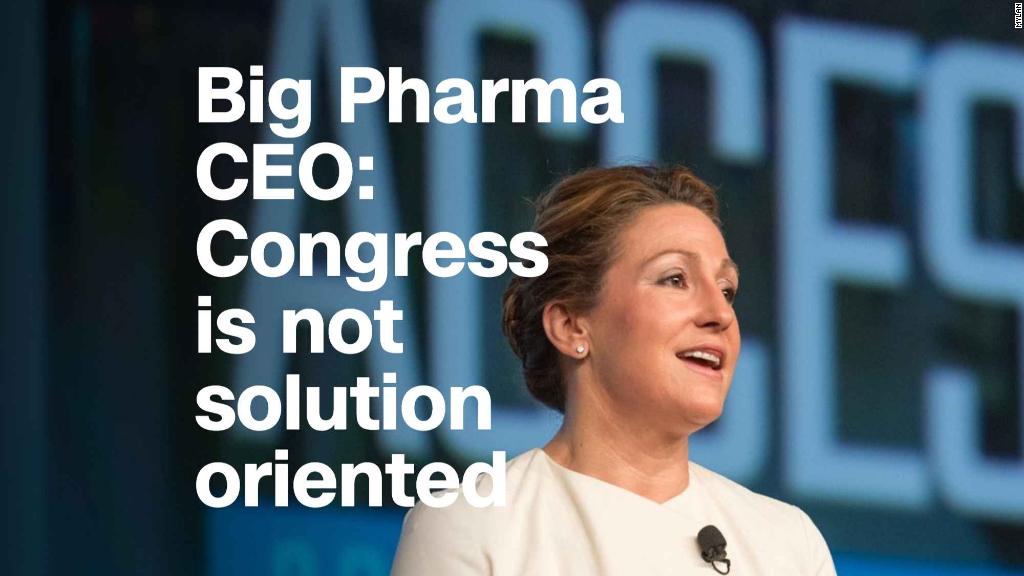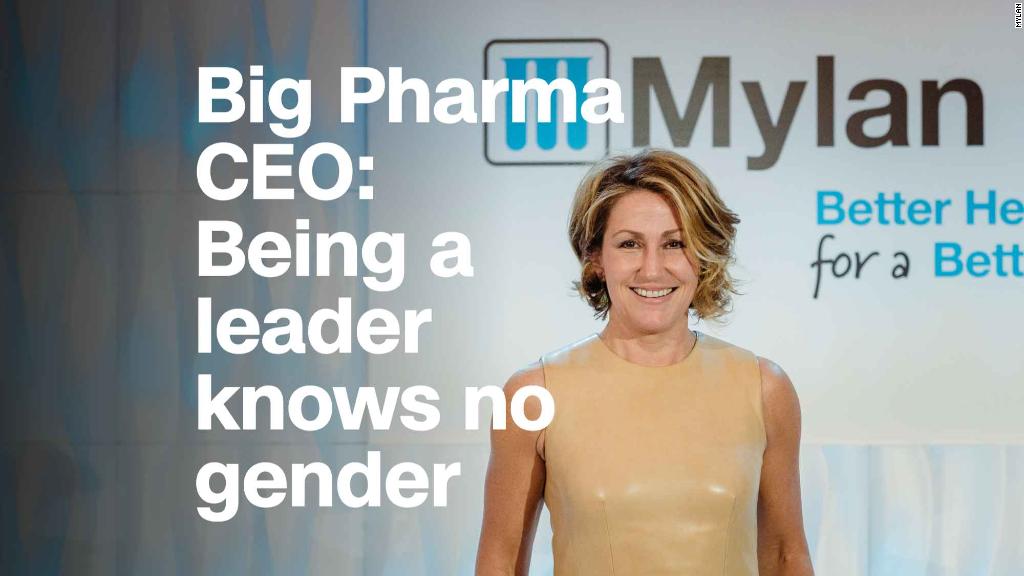
Mylan CEO Heather Bresch hates having to answer to Wall Street.
"You can't build a company in a quarter," Bresch said in a new episode of CNN's podcast "Boss Files with Poppy Harlow."
"We have got to find better ways to measure ourselves and measure success," Bresch said.
Bresch, who stepped into the chief executive role in 2012, has held firm in her decisions as head of the company — even when they've sparked national controversies.
She describes the pharmaceutical firm as a "stakeholder company," rather than a shareholder company. The approach "allows us to take a lot of other things into consideration," she said, aside from increasing sales from quarter to quarter. It's also, on occasion, raised the ire of Mylan (MYL) investors.
Shareholders were mad when Bresch blocked a takeover attempt by the Israeli drugmaker Teva (TEVA) in 2015. Teva offered to buy the shares at high premium, so the acquisition would have been lucrative for Mylan's investors. Still, Bresch stands by her decision.
"We do believe in the long term," she said. "I've said a well-run company delivers great shareholder returns, and we have. And we plan to continue to do so."
Related: Misty Copeland on why it's important for women of color to promote brands
Bresch's efforts to create those returns have been criticized, as well. In 2014, Mylan announced a merger with Dutch company Abbott Laboratories. The acquisition was described by many as a tax inversion — a strategic merger that moves a company's headquarters to a country with a lower corporate tax rate, and allows the firm to pay less in taxes.
For that, Bresch caught flak from her father, Senator Joe Manchin. In response to the announcement, Manchin said publicly that tax inversions should be illegal. The National Journal ran a story with the headline "Senator Manchin: What my daughter did should be illegal."
"He was lucky I was like, 10,000 miles away," when that happened, Bresch told Harlow.
Bresch maintains that the decision to join forces with Abbott was about helping Mylan stay competitive and grow in the United States.
She recalled telling her father after she saw his reaction in the news, "You're getting swept up in the headline and the emotion of it versus understanding substantively what is at hand," she said.
Manchin represents West Virginia, where Bresch grew up and Mylan is based. Bresch said that if Mylan hadn't acquired Abbott, the state would suffer. Her father wasn't thinking about "what, unfortunately, West Virginia could look like without Mylan in it," she said.
Related: Accenture CEO: We seek total gender equality by 2025

But those scandals were blips compared to the uproar surrounding Bresch's decision to hike up the price of EpiPen, which delivers an injection of epinephrine to treat anaphylaxis, a life-threatening allergic reaction.
Between 2009 and 2016, Mylan hiked up the cost of the device 15 times.
Two years ago, the cost of a two-pack reached $609, sparking national outrage. Consumers were so upset by the increase that The House Oversight Committee asked Bresch to testify about the decision.
After the outcry, Mylan decided to start selling a generic version of EpiPen for $300. But she stands by the price hikes. Bresch said while Mylan was raising EpiPen prices, it was investing nearly $1 billion into improving the device and educating the public on anaphylaxis.
Bresch described the controversy as a "defining moment." After it happened, she saw two options for how to move forward.
"I could ... go curl up in a corner, just say I'm sorry, and lower the price," Bresch told Harlow.
She didn't do that.
Related: Nasdaq CEO: We need more female leaders in the financial industry
"I wasn't going to be apologetic for operating in the system that existed," she said. "What I decided to do was put my effort and energy to ... talk about what needed to be fixed, and how broken the system was."
Bresch believes that the the controversy surrounding EpiPen price hikes served as a catalyst to talk about what needs to change.
"There's no question it strengthened me," Bresch said of the crisis. It also inspired her to try to help find a solution.
"Health care is beyond complicated. And we've overcomplicated it as a country," she said. "There's no magic bullet to fix it."
Bresch said she talked with the Trump administration about their efforts to lower drug prices by increasing competition, shrinking regulations and changing incentives in the pharmaceutical industry. She doesn't have any plans to run for office herself — but she's not ruling it out.
"I think I have a lot left in me to make a difference in this world," she said.

